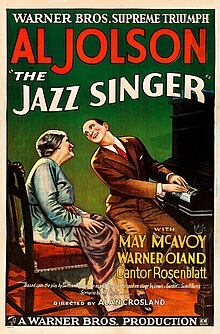Portal:1920s
The 1920s Portal
Silent films were popular in this decade, with the highest-grossing film of this decade being either the American silent epic adventure-drama film Ben-Hur: A Tale of the Christ or the American silent war drama film The Big Parade, depending on the metrics used. Sinclair Lewis was a popular author in the United States in the 1920s, with his books Main Street and Elmer Gantry becoming best-sellers. Best-selling books outside the US included the Czech book The Good Soldier Švejk, which sold 20 million copies. Songs of this decade included "Mack the Knife" and "Tiptoe Through the Tulips". During the 1920s, the world population increased from 1.87 to 2.05 billion, with approximately 700 million births and 525 million deaths in total. (Full article...) Selected article -The Jazz Singer is a 1927 American part-talkie musical drama film directed by Alan Crosland and produced by Warner Bros. Pictures. It is the first feature-length motion picture with both synchronized recorded music and lip-synchronous singing and speech (in several isolated sequences). Its release heralded the commercial ascendance of sound films and effectively marked the end of the silent film era with the Vitaphone sound-on-disc system, featuring six songs performed by Al Jolson. Based on the 1925 play of the same title by Samson Raphaelson, the plot was adapted from his short story "The Day of Atonement". The film depicts the fictional story of Jakie Rabinowitz, a young man who defies the traditions of his devout Jewish family. After singing popular tunes in a beer garden, he is punished by his father, a hazzan (cantor), prompting Jakie to run away from home. Some years later, now calling himself Jack Robin, he has become a talented jazz singer, performing in blackface. He attempts to build a career as an entertainer, but his professional ambitions ultimately come into conflict with the demands of his home and heritage. (Full article...)Featured picture Haile Selassie I was Ethiopia's regent from 1916 to 1930 and Emperor of Ethiopia from 1930 to 1974. The heir to a dynasty that traced its origins to the 13th century, and from there by tradition back to King Solomon and the Queen of Sheba, he is a defining figure in both Ethiopian and African history. Selassie is revered as the religious symbol for God incarnate among the Rastafari movement, whose name comes from Ras (literally "Head," an Ethiopian title equivalent to Duke), and Tafari Makonnen, Selassie's pre-coronation name. Did you know...
Related portalsSelected biography -Al Jolson (born Asa Yoelson, Yiddish: אַסאַ יואלסאָן; May 26, 1886 – October 23, 1950) was a Lithuanian-born American singer, actor, and vaudevillian. He was one of the United States' most famous and highest-paid stars of the 1920s, and was self-billed as "The World's Greatest Entertainer". Jolson was known for his "shamelessly sentimental, melodramatic approach" towards performing, as well as for popularizing many of the songs he sang. Jolson has been referred to by modern critics as "the king of blackface performers". (Full article...)TopicsWikiProjects
List articlesMore Did you know (auto generated)
CategoriesGeneral imagesThe following are images from various 1920s-related articles on Wikipedia.
Recognized content
Associated WikimediaThe following Wikimedia Foundation sister projects provide more on this subject:
Discover Wikipedia using portals |





















































